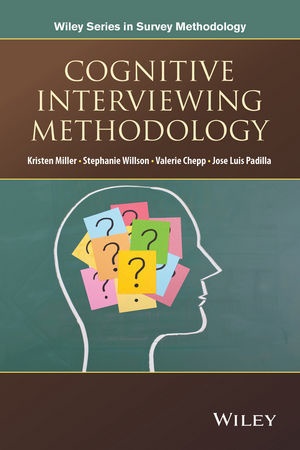Read more
"Acknowledging the impact of sociological factors on the survey process, this book introduces a paradigm for the cognitive interview process. It introduces the interpretive approach to cognitive interviewing, presents the underlying theoretical foundations, and explores the issues relating it. The book also addresses the various aspects of data collection, analysis, and documentation. It is an ideal reference for survey researchers and practitioners in the social sciences who utilize these techniques in their everyday work and as a supplement for courses on survey methods at the upper-undergraduate and graduate levels"--
List of contents
Foreword xiii
Gordon Willis
Acknowledgments xv
Contributors xvii
1 Introduction 1
Kristen Miller
1.1 Cognitive Interviewing Methodology, 2
2 Foundations and New Directions 7
Valerie Chepp and Caroline Gray
2.1 Introduction, 7
2.2 Sociology and the Interpretivist Tradition, 8
2.3 New Directions: Interpretation and Cognition, 9
2.4 Methodological Implications for Cognitive Interviewing, 11
2.5 Conclusion, 14
3 Data Collection 15
Stephanie Willson and Kristen Miller
3.1 Introduction, 15
3.2 Cognitive Interviewing Study Sample, 15
3.2.1 Considerations of Sample Design, 16
3.3 The Cognitive Interview, 20
3.3.1 Differing Approaches to Cognitive Interviewing, 20
3.3.2 Different Kinds of Data: Respondent as Evaluator versus Respondent as Story Teller, 22
3.4 The Role of Interviewer, 28
3.4.1 Interviewer as Data Collector, 29
3.4.2 Interviewer as Researcher, 30
3.5 Conclusion, 33
4 Analysis 35
Kristen Miller, Stephanie Willson, Valerie Chepp, and J. Michael Ryan
4.1 Introduction, 35
4.2 Analysis of Cognitive Interviews: Overview, 36
4.3 Analytic Steps for Cognitive Interviews, 38
4.3.1 Step 1: Conducting the Interview, 39
4.3.2 Step Two: Producing Interview Summaries, 40
4.3.3 Step Three: Developing a Thematic Schema, 42
4.3.4 Step Four: Developing an Advanced Schema, 44
4.3.5 Step Five: Making Conclusions, 47
4.4 The Benefits of a Complete Analysis, 49
4.5 Conclusion, 50
5 Assessing Translated Questions via Cognitive Interviewing 51
Alis´u Schoua-Glusberg and Ana Villar
5.1 Introduction, 51
5.2 Why Use Cognitive Testing in Multilingual Survey Research, 51
5.2.1 Multilingual Research Settings, 52
5.2.2 Instrument Production in Multilingual Settings, 53
5.3 Translation and Translation Assessment Procedures, 54
5.3.1 Team Translation Approaches, 54
5.3.2 Translation Assessment Procedures, 54
5.3.3 Pretesting as Part of Translation Assessment, 55
5.4 Cognitively Testing Translations of Survey Questions, 57
5.4.1 Cognitive Interviewers, 58
5.4.2 Respondent Selection, 58
5.4.3 Introduction, Protocol, and Implementation, 59
5.4.4 Analysis, 59
5.5 Problems Uncovered by Cognitive Testing of Translations, 60
5.5.1 Uncovering Translation Problems, 61
5.5.2 Uncovering Problems with the Source Question, 64
5.5.3 Uncovering Problems Related to Cultural Differences - Need for Adaptation, 65
5.6 Conclusion, 66
6 Conveying Results 69
Valerie Chepp and Paul Scanlon
6.1 Introduction, 69
6.2 Contents of a Cognitive Interviewing Report, 70
6.2.1 Introduction, 70
6.2.2 Summary of Findings, 71
6.2.3 Methods, 73
6.2.4 Question-by-Question Review, 77
6.2.5 Appendix, 80
6.3 Characteristics of a Cognitive Interviewing Report, 80
6.3.1 Transparency, 81
6.3.2 Reflexivity, 82
6.4 Conclusion, 84
7 Case Study: Evaluation of a Sexual Identity Question 85
Kristen Miller and J. Michael Ryan
7.1 Introduction, 85
7.2 Background, 86
7.2.1 Intended Construct for the National Health Interview Survey Sexual Identity Question, 86
7.2.2 Review of Data Quality Problems, 87
7.2.3 Development of an Improved Sexual Identity Question, 89
7.3 Case Study: Co
About the author
Kristen Miller, PhD, is Director of the Questionnaire Design Research Laboratory, National Center for Health Statistics (NCHS). She designs and implements research projects on data quality and comparability, question response, questionnaire design, and cognitive methods theory and methodology. Dr. Miller is a coeditor of Question Evaluation Methods: Contributing to the Science of Data Quality, also published by Wiley.
Stephanie Willson, PhD, is Senior Research Methodologist at the Questionnaire Design Research Laboratory, NCHS. Her research interests include the study of construct validity in survey questions and the methodological evaluation of cognitive interviewing, with particular emphasis on data collection and data analysis.
Valerie Chepp, PhD, is Assistant Professor in the Department of Sociology at Hamline University. Dr. Chepp has 5 years of experience working as a research methodologist at the Questionnaire Design Research Laboratory, NCHS, and her research interests include cultural sociology, theories of inequality and social change, and qualitative research methods.
José-Luis Padilla, PhD, is Professor in the Department of Social Psychology at University of Granada, Spain. His research interests include cross-cultural psychology, psychometrics, and social research methods.
Summary
Acknowledging the impact of sociological factors on the survey process, this book introduces a paradigm for the cognitive interview process. It introduces the interpretive approach to cognitive interviewing, presents the underlying theoretical foundations, and explores the issues relating it.

